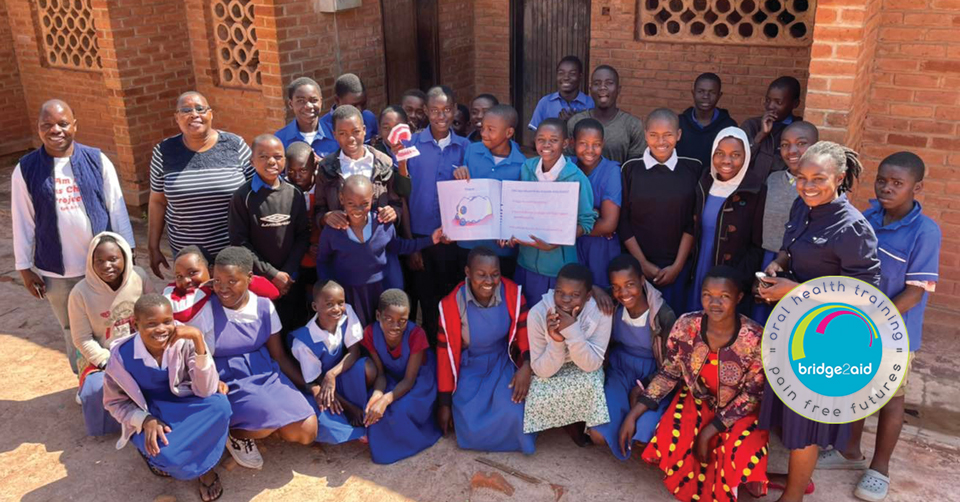The pandemic forced many charities to halt their activities abruptly. Some organisations used this period of forced inactivity to reassess their activities and look for ways of doing things better. Practice Plan Regional Support Manager, Tracy Webb caught up with dental charity, Bridge2Aid’s Chief Executive, Shaenna Loughnane, to find out what changes she and her team had decided to make.
TW: A lot of people will be familiar with the former version of Bridge2Aid and its work, Shaenna, so please explain how things have changed in the last two years?
SL: The pandemic gave all of us a chance to sit back and think. We took a year to look at our strategy and decided to see how we could have the maximum impact on beneficiaries, on getting people out of pain, and on global oral health, with the resources we had.
We wanted to maximise our impact on the healthcare system that was already in place in Tanzania and Malawi, where our projects are focused, and collaborate with local leadership. It’s always been important to me to work with local leaders and partners in the country to make lasting change, as they’re the people that are living and breathing these issues every day. We wanted to do that while minimising the impact on the environment. Obviously, by flying volunteers over to Tanzania, they made a massive difference, but we were impacting the environment and the local healthcare structure, too.
It’s very easy to think, “Yes, we know we are impacting the environment and yes, we know we are possibly taking away from the local dentists. But because we’re doing a good thing, that’s okay.” But actually sometimes that’s not okay. You need to look at, can we do it better?
So, our focus continues to be global oral health and getting people out of pain. But we’ve now shifted slightly away from a curative approach and training healthcare workers, to more of a preventative approach. We were asked by the Tanzanian government to focus our oral health strategies around prevention. The new global strategy on oral health coming out from the WHO (World Health Organisation) is very focused on prevention, and those upstream approaches, rather than downstream curative approaches.
So now we’re focusing on ‘how can we stop the disease happening in the first place?’ And spreading the kind of messages we’re very used to in the UK about brushing your teeth, and your diet. We all have a very high oral health literacy here, whether we act on that or not. In rural east Africa, the oral health literacy is very poor.
TW: How is this change in emphasis affecting your work?
SL: It seems obvious: let’s prevent it rather than cure it. But that’s actually been a huge shift for us. So, to do that, we’re working with local dentists and dental therapists, in Malawi and Tanzania, using a cascade model, in partnership with MalDent Project and Smileawi, and the Ministry of Health in Malawi. We are training dental therapists to train oral health promoters. They are village volunteers who are working with the Red Cross volunteers already in villages to share those messages with them, for them to go into their communities. Because us coming and sharing oral health messages, it’s just not relevant. It needs to come from people who are living in those communities. They understand the pressures, how it fits, and the context. And over the next few months, we’ll be training 90 oral health promoters on a trial project in rural Northern Malawi.
TW: How do people get involved in supporting all that amazing work that you’ve managed to start off already?
SL: That’s a really good question, because we’re building on the support we’ve had over the years, and we don’t want to lose that. The Bridge2Aid community is strong and it’s really important to us.
Firstly, people can help by fundraising. People talk about ‘doing Bridge2Aid’ and that’s very much about going and being in one of our programmes, but we now need ‘doing Bridge2Aid’ to be about supporting us and talking about the issues. So, fundraising as a practice, as individuals, with your friends, raising awareness of the issues around global oral health inequality is how people can help. Money is really important, as we can’t do what we do without that fundraising, but it’s also important to raise the issues and talk about them and being advocates as well.
We have a speaker team, and we need people to join that team to speak on our behalf to local LDC groups, BDA groups, rotary clubs. Also, for each programme we run, we need to write a new curriculum. So, we have a team of volunteers that help us with that input because we are not clinicians. So, people can get involved in writing those training programmes, if they want to. We still want to have our Bridge2Aid community, but it’ll just look different.
We also have some volunteering opportunities. As I said before, about using Malawian dental therapists and dentists to train the healthcare workers. We will still need a few volunteers to go and train the trainers. But we need people with education experience, and skills and training experience. So, there are some opportunities for that, but mostly it’s about talking about the work and about what we’re doing.
TW: Thank you for sharing this with us, Shaenna. If people want to make a donation, how do they go about it?
SL: People can make an online donation via our donation page on our website.
About Shaenna
Shaenna Laughnane is Chief Executive of Bridge2Aid. She first volunteered with the charity in 2006 and officially joined the team as UK Operation Director 2011. Shaenna also has experience as a dental practice owner and BDA Good Practice assessor.
